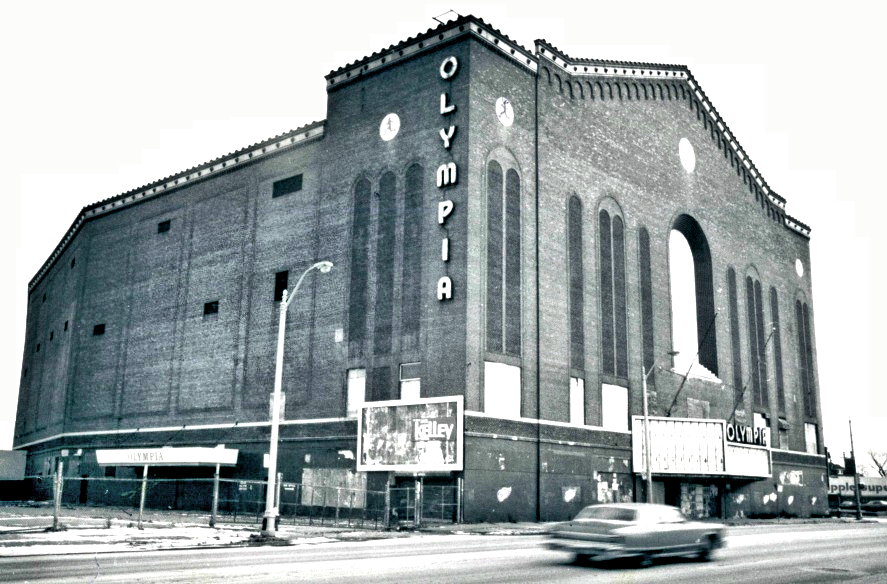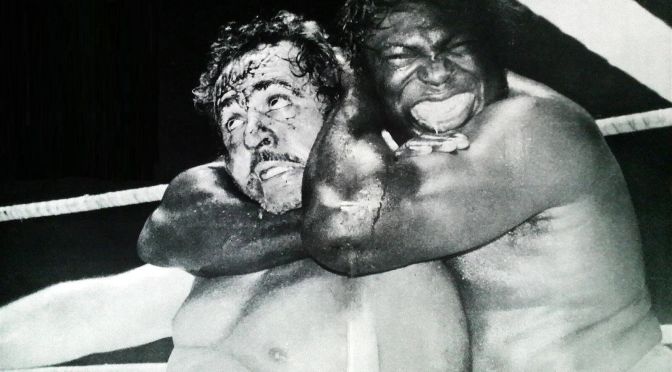In the first of a new series, Will Burns takes a look at the iconic cities in the history of professional wrestling that link perfectly into our story and chronological journey. First up – Detroit.

Professional wrestling shows began running in Detroit in the 1920s but it really started to gain attention when promoter Nick Londos started booking the Detroit Olympia (pictured above) for his grappling events in 1928. Although this was relatively new to the area, it quickly became a popular staple of entertainment for the city.
By the 1930s, after starring in the ring on many Londos shows himself, local star Adam Weissmuller noticed the success wrestling was experiencing and he created his own company labelled ‘Weissmuller Wrestling Enterprises’. He forged links with other promoters, Fred Kohler of Chicago and Al Haft of Ohio, to bring the country’s best talent to the area with great success.
Weissmuller’s accomplishments had surpassed anything the city had seen previously and business was booming. However, Weissmuller suddenly passed away on 8th March 1937. Kohler and Haft, who had become very close with Weissmuller, acted as pallbearers at his funeral.
A former professional boxer with 60 bouts under his belt, Harry Light had started working with Weissmuller and his business partner Louis Markowitz shortly before Weissmuller’s death. Light moved to the area in 1919 after time in the Canadian Navy. He met Weissmuller while working as an usher at the Madison Ballroom when the promoter handed him $30 to collect some change at a local shop for the box office. He returned with the money and the friendship began.
In 1939, Light founded the Harry Light Wrestling Office and began promoting his own shows at Detroit’s Fairview Gardens under the banner of Big Time Wrestling. By 1947, tickets sales were deteriorating in Detroit and Light moved on to nearby Flint, Kalamazoo and Grand Rapids, Michigan to promote shows. Light had gained a television time slot on Channel 7, and once TV sets were being purchased, this gave him a major advantage over the other promoters in the state.
Come 1948, the National Wrestling Alliance was formed and Light signed up to its policies. The NWA agreed to split into regional territories and decided they would not compete with one another. With his NWA membership, Light was able to book the one true World Heavyweight Champion and improve his business further. Light held an important role in the NWA – organising schedules of the midget wrestlers for the territories.
His right-hand man Bert Ruby broke off from Light in the 1950s and created Motor City Wrestling which also became popular. Ruby was also a wrestler and a trainer, but when he promoted shows, he refrained from booking venues in Detroit to impede on Light’s business.
Meanwhile, with the TV audience snapping up tickets, Light’s NWA Detroit promotion held a stronghold in the territory, which did come under threat in 1959. Two men who could not gain membership into the Alliance were Jim Barnett and John Doyle, promoters from Indiana and New York respectively.
They created an outlaw promotion (The Barnett-Doyle Corporation) and started to run shows at Cobo Hall promoting bouts with Verne Gagne, Fritz von Erich, Bobo Brazil and Dick the Bruiser. They made great headway and drew an attendance of over 16,000 fans on their debut in April 1959 at the Olympic.
Light would combat this using his NWA contacts to book North Eastern stars Bruno Sammartino, Haystacks Calhoun and Argentina Rocca from Toots Mondt and Vincent J. McMahon, and promoted “The Greatest Card Ever Presented In Detroit” on 7th October 1961.

Harry Light (front left) signs a lease to bring his wrestling show to the new Cobo Arena (1961)
The city became a hotbed for wrestling throughout the sixties, however, the pressure impacted Harry and he got out of the business as The Corporation took over control. Nevertheless, Barnett and Doyle had cashed enough money to take their product elsewhere. So the NWA rights to Detroit and the state of Michigan were bought out by World Wide Sports for $50,000 in 1964. The company was owned by businessman Francis Fleser and his brother-in-law Ed Farhat and the deal included the TV contract that had three years remaining and a lease on Cobo Hall and the Cobo Arena.
World Wide Sports was filling houses at the Cobo Arena and broadcasting at least two of the Big Time Wrestling TV programs on Channel 7 every week with The Sheik at the top of the card. The man billed from the Syrian Desert was actually co-owner Farhat, a Michigan-born wrestler who had made a name as The Sheik in Chicago, New York and Texas since the fifties.

The Sheik returned home and became a huge draw. Due to his demented hardcore style and the use of weapons on his foes, he quickly became the most hated in the territory. Besides every great heel, there is a great babyface and the ever-popular Bobo Brazil was his counterpart. The pair feuded for decades in bloody battles over the Detroit version of the NWA United States Heavyweight belt.
Outside the ring, competition ascended from Dick the Bruiser and Wilbur Snyder, who had been wrestling for Barnett and Doyle previously in the area. They looked to take advantage of the previous popularity of the grappling game. So in 1971, they created All-Star Championship Wrestling, which operated with stars from their Indianapolis-based World Wrestling Association company – until they gave up promoting in Detroit in 1975.
As the city of Detroit was changing, things started to take a bad turn in the late 1970s for Farhat and Fleser. As people were out of work, the crime rate in the city rose and the crowds started to dwindle. Consequently, The Sheik, Brazil, and others had no option but to take their expertise to other territories to earn a decent payday.
Although Vincent J. McMahon’s World Wrestling Federation sent talent to the region to try and help its diminishing attendances, Fleser and Farhat closed their doors in late of 1980. It was a sign of things to come, as the WWF landed a TV spot in the area, took over the Detroit bookings and readied itself for national expansion.
The Sheik and Brazil continued to wrestle for other territories and we will profile their historic careers closer in upcoming articles. For Harry Light, he retired in the area, was married with six children until he sadly passed away on October 29th 1971.
Detroit became an important city in the history of professional wrestling and if you were fortunate enough to live through the 1960s until mid-70s in the area, you were incredibly privileged to witness the stories unfold. The fans in the area can be thankful for the likes of Light, Barnett, Doyle, Sheik and Brazil for the memories they created and the paths they paved for the generations to come.
Will Burns
Source: Mark James – Wrestling Record Book: Detroit 1964-1980, Tim Hornsbaker – National Wrestling Alliance, Newspapers.com

